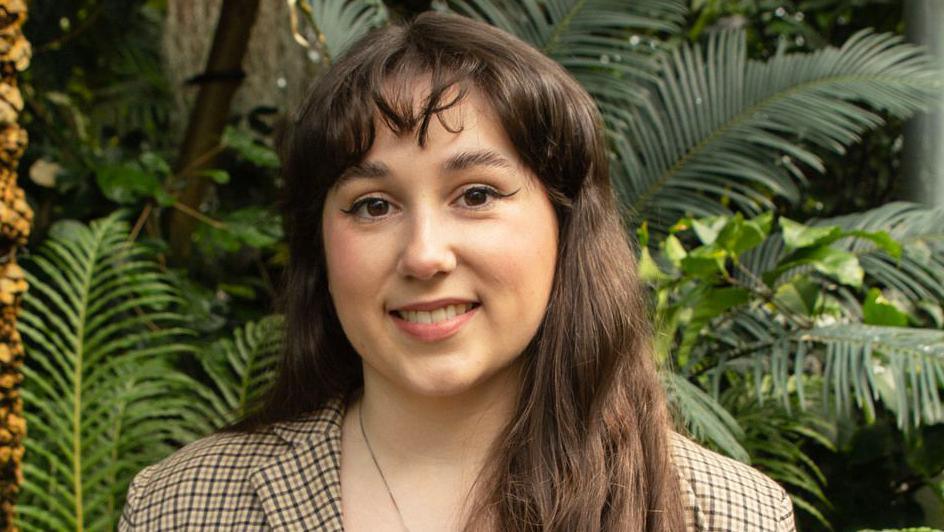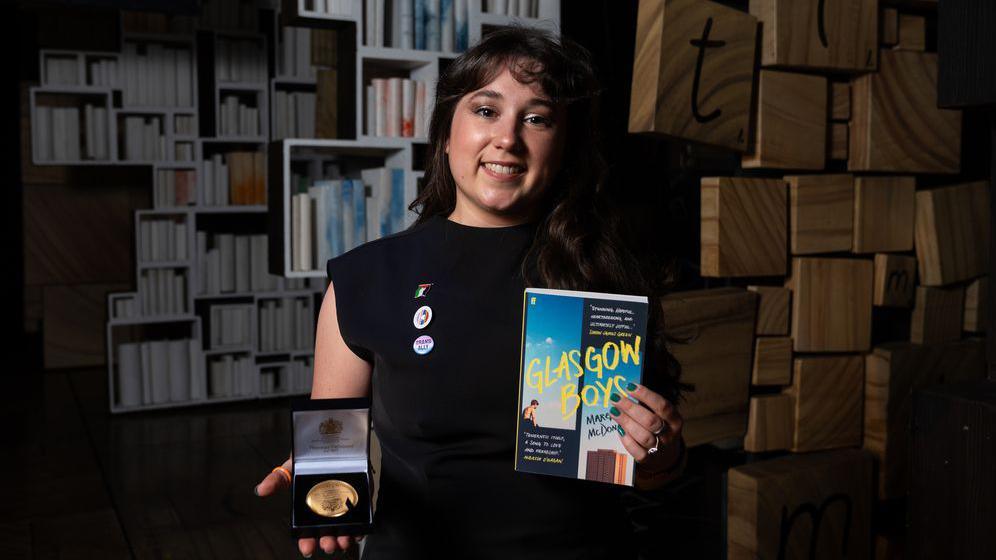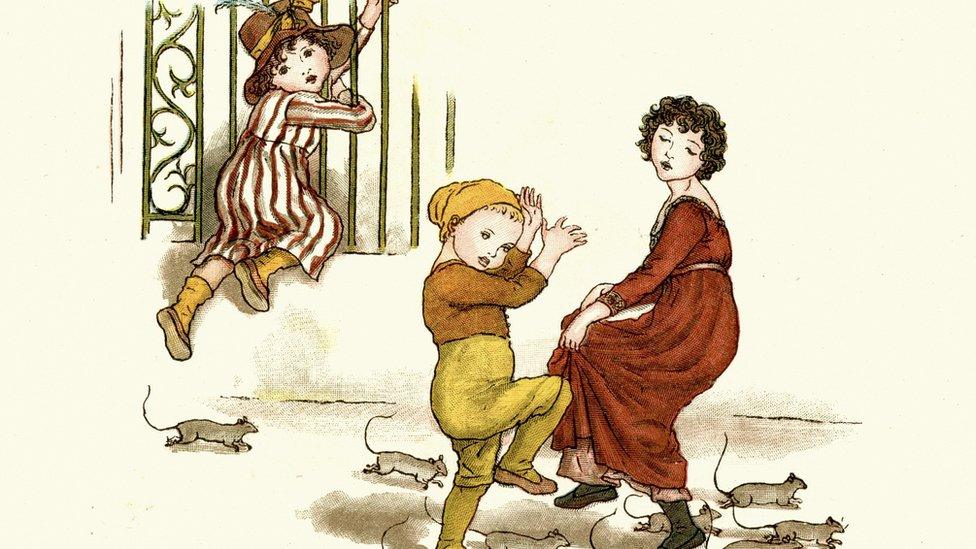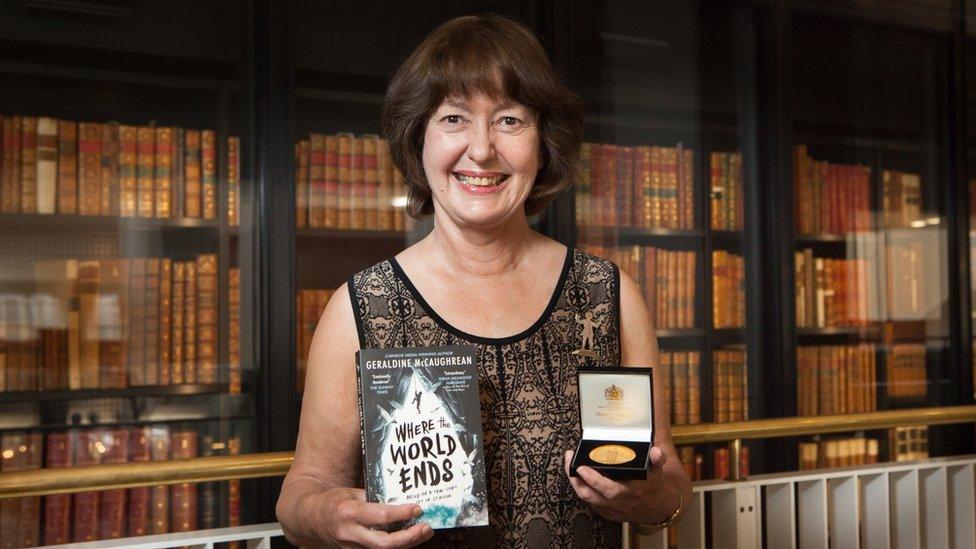'My award-winning book was ignored by 60 agents'

Margaret McDonald is the youngest winner in the 90-year history of the Carnegies
- Published
Margaret McDonald says being raised working-class in Glasgow meant she was often self-deprecating and doubtful of her writing abilities.
At school, she said it was embarrassing to try and succeed at creative subjects - but she knew she was onto a winner with her debut novel Glasgow Boys.
More than 60 agents ignored her attempts to pitch the book before she finally secured representation.
And now the 27-year-old has been named the youngest ever winner of the Carnegie Medal for Writing in its almost 90-year history.
"It's just been a complete whirlwind," she said. "It was beyond my wildest imagination of what we would achieve for Glasgow Boys when we published it."
The Carnegies are the UK's longest-running book awards for children and young people and are judged by a panel of children's and youth librarians.
The awards were established in 1936 in memory of Scottish philanthropist Andrew Carnegie.
'Invisible barriers'
Glasgow Boys follows two teenagers navigating the care system and the invisible barriers that come with that in adulthood.
McDonald wrote large parts of the novel while she recovered from an operation related to her Crohn's disease.
She said: "As someone who is invisibly disabled, working class and a first-generation university student, it was important to me to showcase the difficulties of making your way through a world that is essentially not built for you.
"We don't often speak of these invisible barriers but navigate them regardless.
"It was something that was deeply important for me to showcase the strength, the community, the humour and the love of the people within Glasgow Boys."

Judges praised Margaret McDonald for her "emotionally honest" and "hopeful" debut novel
The author said she decided to donate her £5,000 prize money to Action for Children, a charity which helps vulnerable children in and out of care.
"I'm hoping it can make a difference," McDonald said. "The care system is probably the biggest theme in Glasgow Boys and it's not something that I have lived through.
"So it felt really important to me that Glasgow Boys made an actual real world impact on the lives of people in care and people coming out of care.
"I couldn't think of a better use for the money than making sure Glasgow Boys was an actual force for good."
Different backgrounds
The eponymous Glasgow Boys are Finlay and Banjo, two teenagers who McDonald says are "like chalk and cheese".
Finlay is studying nursing at the University of Glasgow, while Banjo is trying to settle into a new foster family and finish high school.
"I wanted to write about two characters who would have no reason to know one another and they would be forced into this close-proximity situation," she said.
"To me, Glasgow Boys is about unconventional forms of love, platonic and romantic.
"Banjo and Finlay have a real kinship, like platonic soulmates, and it felt very important that they were really different and came from different backgrounds."
McDonald said she hoped the book would provide a platform for dialogue around the care system even if people disagreed with its portrayal in the novel.
She said she also hired a sensitivity reader who had first-hand experience of the care system to ensure the book was authentic.
McDonald added: "If people are interested in writing about lived experiences that aren't your own like marginalised identities, there are ways to go about it sensitively.
"You don't have to write an autobiography or keep to your own experiences, you can definitely venture out.
"But if you're touching upon a community you're not a part of, I would encourage people to get in touch with that community and make sure you have their best interests in mind."
McDonald started writing the novel at 19 while she took time out from her creative writing studies at Strathclyde University to recover from a bowel operation related to her Crohn's disease.
She was forced to shield during the pandemic due to being immunosuppressed and high risk, and the novel began to take shape during that time.
'Honest and hopeful'
By the middle of 2022, McDonald had finished the book and it was ready to be pitched to agents.
She said Glasgow Boys was just one of ten books she had written since she was a teenager, but she was convinced it was her best.
"I was a dog with a bone and cold-queried agents and pitched myself," she said.
"It's a really mortifying ordeal and you have to really sell yourself and why your book is brilliant and unlike any book published.
"Especially with being brought up Scottish and working class, you're just taught to be very self-deprecating - but having confidence in yourself is how you'll succeed."
She said she cold-called about 60 agents over eight months, before she finally got an offer of representation.
"I started in January and gave myself until August to find an agent," she said. "And finally an offer came in at the end of July."
The panel of judges at the Carnegies praised the book for it's "honest" and "hopeful" tale.
Ros Harding, chair of the judges, said: "Glasgow Boys is an immersive and visceral read that completely draws the reader into the present and past lives of Finlay and Banjo.
"It is a book that will stay in the mind of the reader long after finishing it."
- Published16 August 2023

- Published18 June 2018
